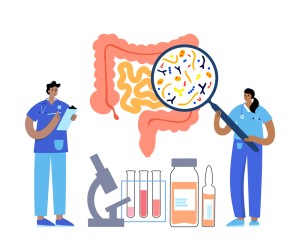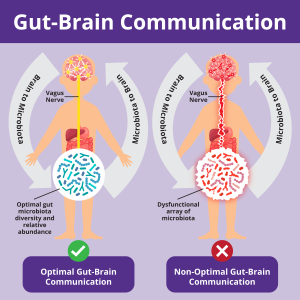The Gut-Brain Connection in Children with Special Needs
 Many children with special needs often struggle with stomach and digestive problems. This has led researchers to take a closer look at the gut microbiome – the trillions of bacteria living in our intestines and how it may play a role in child development.
Many children with special needs often struggle with stomach and digestive problems. This has led researchers to take a closer look at the gut microbiome – the trillions of bacteria living in our intestines and how it may play a role in child development.
Studies have found that when the gut’s balance of bacteria is “off,” it may also affect the brain, emotions, and social behaviors. While scientists don’t yet fully understand the exact link, they believe the gut and brain are closely connected through what’s called the microbiota-gut-brain axis.
So, how might the gut affect these symptoms?
*Leaky gut: Changes in gut bacteria may make the intestines more “permeable,” letting substances slip into the bloodstream that normally wouldn’t.
*Immune function: Gut imbalances can affect the immune system, possibly triggering inflammation.
*Brain chemicals: Gut bacteria create substances that may influence brain function and behavior.
*Gene activity: Some research even suggests gut microbes might affect how certain genes are “switched on or off,” which could play a role in these same symptoms.
The Gut Brain Axis
 Due to these discoveries, scientists are now exploring new therapies that target the microbiome. These include:
Due to these discoveries, scientists are now exploring new therapies that target the microbiome. These include:
*Probiotics and prebiotics* (to restore healthy bacteria)
*Dietary changes and supplements
Early results are promising.
Why it matters
This growing field of research shows that gut health may be more closely tied to brain health than we ever realized. Understanding and supporting the gut microbiome could open up new ways to ease certain challenges faced by children with autism and other special needs.
Teknon Protocol. This formula has been especially designed for Special Needs Children to improve their Metabolism.
Children with Special Needs often have a limited range of preferred foods, which can make it challenging to meet their nutritional requirements. In such cases, a dietary supplement like the TEKNON Protocol can play a vital role in supporting their health. This protocol is designed to help balance gut health, enhance metabolic function, and boost the immune system through targeted nutrition.
At the heart of the TEKNON Protocol is camel milk—a nutrient-dense food known for its exceptional health benefits. Rich in protein, camel milk contains natural antibacterial and antiviral compounds, antioxidants, and immune-supporting nutrients. It also delivers essential vitamins and minerals, including B vitamins, which are crucial for metabolic processes.
Specifically developed to support the unique metabolic needs of children with Special Needs, the TEKNON Protocol integrates scientifically backed nutritional strategies to promote optimal physiological function and overall well-being.
Understand the TEKNON Protocol
Want to try Teknon? (We know sometimes it is hard to introduce a new formula to a special needs child). Try 2 Packets for 24% Off & Free Shipping (Go to Shop to Order)
Sign up to receive the MCVitamins Newsletter!
Up-to-date info on the latest health-related news happening in the world
(available in English only)

